#flag point in andaman
Explore tagged Tumblr posts
Text
Flag Point in Andaman: Where Land and Sea Converge in Harmony
Embark on a captivating adventure with SeaBeach Delight to Flag Point in Andaman. This picturesque coastal gem awaits your exploration, where pristine beaches meet lush landscapes in perfect harmony.
At Flag Point, you'll discover a tranquil escape from the hustle and bustle of everyday life. Marvel at the breathtaking vistas of the Andaman Sea, breathe in the fresh sea breeze, and immerse yourself in the natural beauty that surrounds you. Whether you're seeking a peaceful retreat or a place to reconnect with nature, Flag Point in Andaman, offered by SeaBeach Delight, promises a rejuvenating experience that will leave you with lasting memories of this serene coastal paradise.
#Flag Point in Andaman#andaman tour packages for couple#travel#best travel agency in port blair#andaman
0 notes
Text
Elevate Your Andaman Trip with Mansha Hotels in Port Blair

Port Blair, the capital of the Andaman and Nicobar Islands, is a paradise for travelers seeking a mix of adventure, relaxation, and cultural experiences. The city offers a plethora of attractions, from the stunning Radhanagar Beach to the historic Cellular Jail. To make your trip truly unforgettable, it is essential to choose the right accommodation.
Among the many options available, Mansha Hotels stand out for their exceptional service, comfortable rooms, and strategic locations. In this blog, we will explore how Mansha Hotels can elevate your Andaman trip and provide you with a memorable experience.
Location and Accessibility
Mansha Hotels are strategically located in the heart of Port Blair, making it easy to access various attractions and amenities. Hotel Mansha Regency, for instance, is situated near the Secondary School in Dilanipur, DAG Colony, and is just 3.1 km from Veer Savarkar Airport.
This proximity ensures that you can easily reach your destination without any hassle. Additionally, the hotel offers airport shuttle services, making it even more convenient for travelers.
Comfortable Rooms and Amenities
Mansha Hotels offer a range of rooms that cater to different needs and preferences. From luxurious suites to family rooms, each room is carefully designed to provide a comfortable and relaxing stay.
The rooms are equipped with modern amenities such as air conditioning, room service, and a fitness center. The hotel also features a swimming pool, a multi-cuisine restaurant, and a banquet hall, making it an ideal choice for both leisure and business travelers.
Exceptional Service
The staff at Mansha Hotels are known for their friendly and helpful nature. They are always ready to assist with any queries or requests, ensuring that your stay is hassle-free and enjoyable.
The hotel also offers various services such as laundry, dry cleaning, and a tour desk, which can help you plan your trip and make the most of your time in Port Blair.
Dining Experience
Mansha Hotels offer a range of dining options to suit different tastes and preferences. The hotel's multi-cuisine restaurant serves delicious food made with love, and you can also enjoy a romantic candlelight dinner by the poolside.
The hotel also offers packed lunches for those who want to explore the city or nearby attractions.
Activities and Attractions
Port Blair offers a variety of activities and attractions that can enhance your trip. Mansha Hotels are located near many popular spots, including the Radhanagar Beach, which is known for its stunning views and serene atmosphere.
You can also visit the Samudrika Marine Museum, which is designed to create awareness about the oceanic environment. Other activities such as gymming, swimming, fishing, and water sports are also available in the area.
Conclusion
Mansha Hotels in Port Blair offer a unique combination of comfort, service, and location that can elevate your Andaman trip. Whether you are looking for a relaxing getaway or an adventure-filled vacation, the hotel's amenities and services can cater to your needs.
With its strategic location, comfortable rooms, and exceptional service, Mansha Hotels are an ideal choice for travelers seeking a memorable experience in Port Blair.
What are the Must-Visit Attractions Near Mansha Hotels in Port Blair
Mansha Hotels in Port Blair are strategically located near several must-visit attractions that can enhance your Andaman trip. Here are some of the top attractions near the hotels:
Radhanagar Beach: Known as Beach No. 7, Radhanagar Beach is one of the most famous attractions in Havelock Island and the Andaman and Nicobar Islands. It has been recognized as the best beach in Asia and the 7th best beach in the world by Time Magazine in 2004.
Flag Point Trianga: This attraction is just 0.5 km away from Hotel Mansha Regency, making it easily accessible for guests.
Auraa: Located 0.1 km away from the hotel, Auraa is another nearby attraction that guests can visit.
Naval Marine Museum Samudrika: This museum is 9 minutes on foot from the hotel and offers insights into the marine life and culture of the region.
Veer Savarkar International Airport: The airport is 3 km away from the hotel, making it convenient for guests to travel to and from the hotel.
Cellular Jail: Also known as 'Kala Pani', the Cellular Jail is an old colonial prison that is a significant historical landmark in Port Blair. It is approximately 3.1 km from Hotel Mansha Regency.
Wandoor Beach: This beach is part of the Mahatma Gandhi Marine National Park and is known for its rich marine biodiversity. It is about 10 km away from the hotel.
Mount Harriet National Park: This national park is home to several species of birds and animals and is approximately 10 km away from the hotel.
Chatham Saw Mill: This 19th Century attraction is renowned as the oldest and the largest sawmill in the Andaman and Nicobar Islands. It is about 10 km away from the hotel.
Jolly Buoy Island: This island is part of the Mahatma Gandhi Marine National Park and is known for its rich variety of underwater life. It is approximately 30 km away from the hotel.
These attractions offer a mix of natural beauty, history, and culture that can enhance your trip to Port Blair.
Final Tips
Book your stay at Mansha Hotels in advance to ensure availability and the best rates.
Plan your trip according to the weather and avoid peak season if you prefer fewer crowds.
Explore the local markets and try the local cuisine for a unique experience.
Don't miss the stunning views of the Radhanagar Beach and the Samudrika Marine Museum.
By following these tips and choosing Mansha Hotels for your stay in Port Blair, you can elevate your Andaman trip and create unforgettable memories.
#Hotels in port Blair#Best restaurant in port Blair#Best seafood in port blair#Best seafood in andaman#Luxury hotels in andaman#Luxury hotels in port blair
0 notes
Text
Exploring the Andaman Islands: A Guide to Port Blair, Swaraj Dweep, and Neil Island

In December 2023, I explored the Andaman Islands, an extraordinary place. Here’s how it went and some advice if you plan.
Chapter 1: Exploring Port Blair
Cellular Jail Light Show: This is something you've got to see. I booked the 7:30 pm show online. It’s really hot there, so bringing a water bottle is a good idea.
Samudrika Marine Museum: This place is amazing. It displays rare sea creatures and provides information about the local tribes. It’s definitely not your ordinary museum.
Marina Park and Corbyn's Cove Beach: Spending an evening at Marina Park is so peaceful. It’s a great spot to relax. Then, I took a quick ride to Corbyn's Cove Beach. The beach itself is okay, not the best, but it’s a nice place to visit. The jet ski experience there is pretty cool. Also, make sure to check out Flag Point; it’s along the same route.
Chapter 2: Adventures in Swaraj Dweep (Havelock Island)
Ferry to Swaraj Dweep: If you're going to Havelock, definitely opt for the deluxe class on the ferry. The sea can get pretty rough, and the extra comfort really helps.
Elephant Beach: This place is a paradise for fun activities. You can enjoy snorkelling, seawalk, and jet skiing. Trekking there gives you more time to enjoy everything. The snorkelling is a must-do – the coral and fish are just amazing. And the seawalk, well, it's something else. I couldn’t do it because my ears didn’t agree, but you should totally try it if you can. It's the only place in India where you can do this.
Kalapathar Beach: The sunrise here is absolutely stunning. I rented a scooty, which was great because I got to enjoy Kalapathar in the morning and then head to Radhanagar later in the day. Radhanagar Beach is just so beautiful, especially at sunset. And hey, if you're there, get some photos taken. There are local photographers around who really know their stuff – they've got the best poses and spots figured out.
Chapter 3: Neil Island (Shaheed Dweep) Discoveries
Lakshmanpur Beach: This beach is a quiet place where you can really feel the peace. The sea level changes a lot here, which is cool to watch. But a heads-up about Neil Island — it's a bit off the grid. If you're relying on your phone, you might find it tricky. I barely got any signal with Jio, and Airtel was just a little better.
General Observations and Conclusion In Andaman, the locals are incredibly friendly and welcoming, making you feel right at home. It's funny, due to the islands not being overly crowded, you often bump into the same tourists at different spots, which adds a familiar feel to the whole trip. It's perfect for family vacations – I'd totally recommend bringing your parents along. Wrapping it up, Andaman is a world apart from busier places like Goa. It's the ideal spot if you're looking for a laid-back, family-friendly getaway. The rich Bengali culture and stunning natural beauty here make it a truly unique destination.
Andaman ocean :
https://youtube.com/shorts/8lb-zWnzQTI?si=vdYCVmG3z-wNIvHT
#neil island hotels#LakshmanpurBeach#TravelDiaries#andamanislands#FamilyVacation#NaturalBeauty#CulturalRichness#LaidBackGetaway#TravelExperience
0 notes
Link
I heard a family member make remarks on the ‘victims’ of Hurricane Florence, who knew well in advance the possible horrors which came crawling their way. But were those who decided to stay victims given the warnings? They also espoused, essentially, that rescue teams shouldn’t put their lives at risk for those who remained in harm’s way.
This brought me back to a conversation with a man who has been big on situational awareness in terms of avoiding assailants who aim to pierce your heart and rob you while you lie in a pool of your own blood. He asked this question about what one does when in a dark alley and you see a suspicious character coming your way? My response was something to the extent of whether or not I even had to be in the dark alley? That was his point.
https://www.youtube.com/watch?v=bHq4dbQBa14
Now, I’m not remotely suggesting rescue teams avoid doing their job, but it did get me back to situational awareness and understanding the justice brought about when you are foolish enough to venture into a dark alley on the wrong side of town, or remaining in Florida when you damn well knew the potential risk involved.
That got me thinking about the recent political violence and acts of domestic terrorism caused by Black Lives Matter and Anti-Fascists. So, in regards to our contemporary state of the political and cultural arena, and what surely awaits us in the next US presidential election, here are some simple, basic tips about situational awareness and being prepared in case civil unrest breaks out.
1. Understand The Baseline Of Your Environment

Political rallies across the US demonstrate the capacity of violence and the willingness to assault in ruthless manners. Both men and women of more right-wing views have been assaulted, been threatened to be raped, have their families killed, get doxxed, have dead animals thrown at their living quarters, had their finances threatened, etc. It’s a goddamn nightmare on the more North Side of America than the South Side, where not everyone has a bamboo stick up their ass.
There are many great articles written on situational awareness. And that’s key: situation. The environment, in a general sense, has a baseline. It’s the basic overall feel and operation of that set area.
For example, you go to the mall. What’d you expect to see, generally speaking? People walking and talking, laughing and usually carrying a bag or two. It would, in this context, be out of the ordinary if an individual, dressed in all black, is quickly walking through a crowd while he has his hoodie on and hands in his pockets. It’s odd behavior. Same for someone moving nervously carrying a bag that does not appear to be bought at a store or, to add to that, he doesn’t have workman apparel. It’s out of the ordinary.
If I’m at a bank and someone walks in, sits in the corner for an unreasonable amount of time without engaging in any transaction and appears to not work there, I’m alert. Are his eyes moving around scanning for cameras, are his lips moving to suggest he’s counting something, is he in apparel which could perhaps more easily conceal a gun?
Same if I’m out sitting while enjoying coffee and an all-black car pulls in and just sits. Whether the engine is on are not does slightly change the degree of the potential threat of the situation. If it’s on, is it a quick getaway for a potential crime? And is it at night where there are fewer people and witnesses?
These are all pretty basic to practice, in my view. So it doesn’t help when everyone’s head is glued to their smartphones. Especially with women. They appear to be much less aware than men who themselves very much have this issue with their smartphones.
2. The Gray Man At Political Rallies

The concept of the Gray Man is simple: blend in. Do not create stimuli around you. Gray is often considered a very bland color. It’s boring, lifeless, moot. This isn’t to suggest wearing gray makes you undetectable, but the concept works well with this color.
Blend in so well to your environment that you essentially appear bland. But if you’re at a political rally, then you know anyone is a potential threat. Wearing a Trump hat or an American flag raises suspicion, creates stimuli from your political adversary, and now you are made. If you’re European-American, wearing a hat over your shaved head is a good idea in terms of lessening your presence because there is still widespread delusion about the reincarnation of literal Nazis.
People involved with BLM, AntiFa and other leftist gangs are already going to make assumptions about your character and will dehumanize you and engage violently. Perhaps lessening that delusion, if even possible, could potentially add to your safety and security, in some respects.
It’s not that one desires to give up their chosen headwear and so on, but weighing the pros and cons should be obvious if you wish to avoid conflict. Which, again, these days is hard to do.
3. Consider Your Neighbors And Conversation

Depending upon your living situation, if you’re in California, talking openly with your neighbors about politics in relations to conservatism, in a positive light, creates quite a stir of stimuli. And, given the next US elections are coming up, you’ve made an impression in their mind. If they believe you are a literal Nazi, you’ve coined a political adversary. If you’re in the deeper South surrounded by red-necks and American-loving Christians, chances are, from my observations, you’ll be less likely to be attacked for your political (or religious) views.
I personally despise having to sometimes lower my voice or take a quick glance around because I’m about to say something that might cause stimuli to a potential assailant. But, in these contemporary times, it’s up to you to decide what’s worth it and what’s not.
Conclusion
These are merely a few things of quality in regards to your safety and security. I’ve been quite observant. It’s not always intentional, but I’ve seen things and made assumptions (or had a strong thought about it) and turned out to be spot on.
Identity your adversary. Weigh in how much of a threat they are to you. Pay attention to who they know or talk to, then extend that person’s conversation partners and then extend it again. Leftist are ruthless, dangerous, hateful devils. And remember, if you ever see anyone wearing the hammer and sickel, then be even more alert.
Read Next: Being Situationally Aware Is A Matter Of Life Or Death
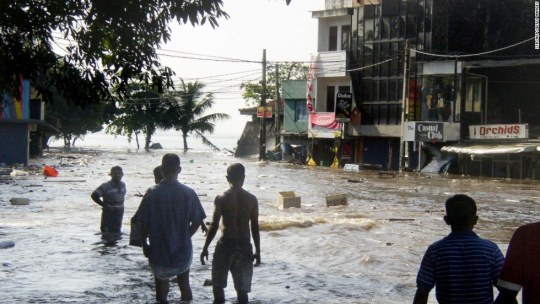
It is 7:30am on the day after Christmas in 2004. The sun is already up in the blue sky of the Andaman sea, and some rare tourists are walking on the main beach of Phi Phi island in Thailand. Most of the tourists are still sleeping, dealing with the usual hangover that comes with the traditional Christmas party.
The locals are busy preparing the long tail boats they use to cruise around the nearby islands. Some Westerners like me, who live here, fill and carry the diving tanks the scuba divers will use to explore the underwater reefs today.
In less than an hour, this idyllic landscape will turn into a dramatic nightmare and many of those people will die, crushed and drowned by the powerful wave of a tsunami coming from the Indian Ocean.
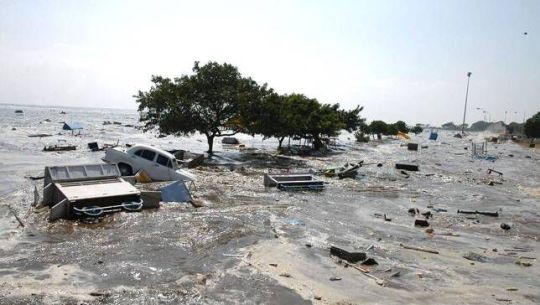
Was there a way to prevent that? Not more than preventing a hurricane in Florida or an earthquake in California. Scientists can predict it, multi-million dollar sensors can detect it, information networks can announce it through various media, but there is no way to prevent it from happening. But we can be more prepared than when I experienced this tsunami in Thailand. Governments and local administrations can invest in infrastructures to mitigate the potential risks and better inform the general public.
And individuals can be better prepared to deal with the consequences of natural events. The people who tragically died on this island were not different from any other people on this planet. As a matter of fact, a vast majority of them were young and relatively fit. They didn’t survive for only a handful of reasons, mainly:
lack of situational awareness
lack of appropriate mindset
lack of physical skills
The situational awareness and appropriate mindset are mainly due to the fact that, when we are on vacation on a tropical island, the last thing we want to think about is the remote possibility of a tragic event of any kind. If the place is nice and sunny, if the locals are friendly and smiling, we quickly feel safe and let our guard down. No pickpockets, no fire, no mugging, no earthquake, no car crash, and therefore no need to pay attention to any precursor sign, no need to keep our valuables and documents with us at all times, no need to have a look at evacuation routes, fire exits, etc. In other words we quickly become complacent when everything looks like paradise.
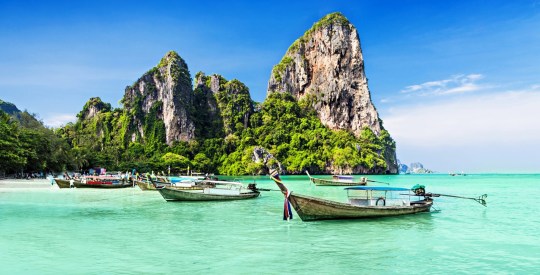
But this lack of situational awareness and appropriate mindset was only one side of the coin for the many fatalities that occurred that day in Thailand. One of the main culprits was the lack of physical skills. Many people didn’t survive simply because they didn’t have the physical abilities to deal with what happened to them and around them.
Some were not comfortable in the water and couldn’t swim across the strong current that the wave and the obstacles created. The event only lasted a few minutes but the water raised quickly and submerged the lowest part of the island.
Some were not able to hold their breath for a few seconds. When the wave hit the hotels and guesthouses near the beach, most of the rooms were submerged very rapidly, but not for very long. Surprise and panic killed a lot of people in their rooms.
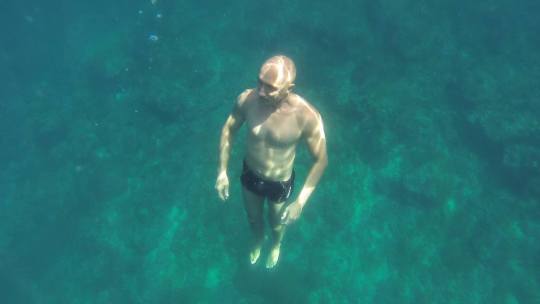
Some were not able to hold on to fixed objects for more than a few seconds. The current was strong and being able to hold on something, or even better to climb onto something, was a good way to increase the chance of surviving.
Some were not able to run away and climb a hill or a stairway. For those who were on the beach and saw the wave coming, the proper action was to sprint and find high ground. Reaching the highest floor of a hotel or one of the nearby hills was a good way to avoid the full force of the tsunami.
Some were not able to push away heavy objects. Entrapment was one of the major risks in this event. Many people drowned because they lacked the necessary strength to move away the objects that the current pushed onto them.
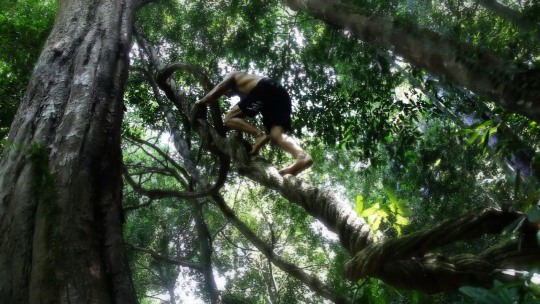
The Western world tends to rely heavily on tools to make our life easier and tools to make it safer. Instead of dealing with the weather, we use tools to make it more bearable (A/C, heater, umbrella, raincoat, sunscreen, etc). Instead of moving in this environment, we rely on tools (a car or an ATV instead of walking and running, a canoe or a boat instead of swimming). We easily blame the lack of protection that can get us injured (“I cannot walk/run without shoes”, “I cannot float without a flotation device”, “I will fall and break my skull if I don’t wear a helmet”, etc).
Tools are fine and make our life more enjoyable most of the time, but what if? What happens when we don’t have them? That’s where skills and physical abilities make plenty of sense. Every one of us, regardless of age, gender and race should be able to do at least the following things:
sprint for at least 100 yards/meters in order to get out of danger (collapsing building, wild fire)
climb over a wall or fence at least shoulder high (to escape an angry pitbull or a group of thugs)
carry for at least 10 yards/meters someone of 3/4 of your size and bodyweight (to save someone from an immediate danger)
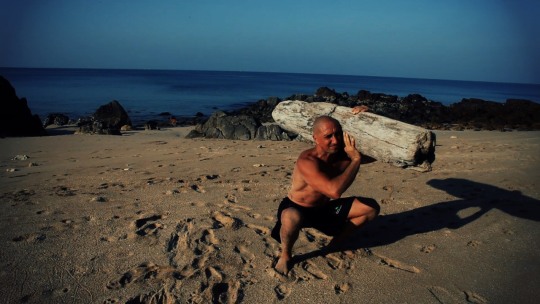
swim at least 100 yards/meters without stopping and float at least 10 minutes with no aid or support (to get out of a dangerous zone and wait for a rescue vessel)
walk 5 miles in an hour (to reach a gas station when you run out of gas and you cannot call for help)
perform some basic self-defense techniques (striking, grappling) to react appropriately in a mugging/rapping/life-threatening situation
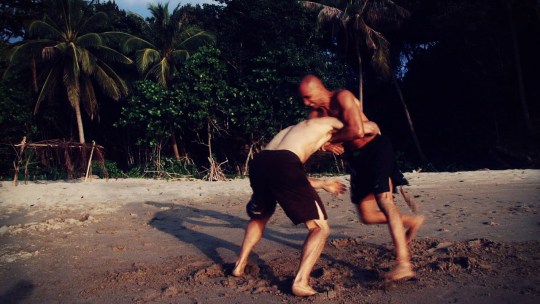
hold your breath for at least one minute while walking/moving at a slow pace (to escape the toxic fumes of a building on fire)
crawl for at least 30 yards/meters to seek cover (active shooter situation) or rescue someone (a child hidden under a car, or someone trapped under or inside something)
If you think that any of those abilities is way beyond your limits, it’s maybe time to reconsider your priorities in life. Being self-sufficient and prepared doesn’t mean relying on tools—it’s knowing that you can deal with dramatic circumstances to the best of your abilities. Tools come in handy when you have physical limitations (age, injuries, illness) but they shouldn’t be the first line of defense.
Having some regulations that require a floatation device in every hotel room in Thailand will not save any life if the next tsunami in the region happens in South Korea. Use your body and your brain. They are the original tools, and you have them with you all the time!
Read More: How To Improve Your Situational Awareness From One Minute Of Effort Per Day
1 note
·
View note
Photo

Port Blair Shawarma (पोर्ट ब्लेयर शवर्मा) (Cafe) (कैफ़े) Flag Point, Port Blair, Andaman & Nicobar, Island 👨🏻🍳Job Available👩🏻🍳 नौकरी उपलब्ध >> Shawarma Maker (शवर्मा मेकर) Call📞 9497833278 #jobrequirements #hoteljobs #hotelstaff #restaurantjobs #resortjobs #waiterskit #workgobiz (at Island) https://www.instagram.com/p/CarWTfAuT6-/?utm_medium=tumblr
0 notes
Text
India News | Swarnim Vijay Varsh Celebrations at Indira Point in 2021
India News | Swarnim Vijay Varsh Celebrations at Indira Point in 2021
Swarnim Vijay Varsha Vijay Jyoti was taken to Indira Point, the southernmost tip of the country, on August 22, 2021, as a part of its visit to the Nicobar Islands. Armed Forces personnel of Andaman and Nicobar Command hoisted the national flag on the occasion and also collected soil from here to make the important occasion memorable. The journey of Vijay Jyoti is from north to south across the…

View On WordPress
0 notes
Text
The KAL 858 Bombing Was a CIA/NIS False Flag, Part 4: Supposed Childhood Images of Kim Hyon-hui in DPRK Are Bogus
Although the RoK government has released images purporting to show alleged KAL 858 bomber Kim Hyon-hui in DPRK as a child, independent researcher Hyeon Jun-hui says the pictures can't possibly show the young Kim.
Hyeon focuses on discrepancies between the shapes of the young and old Kims' ears. The supposed young Kim's ears are round, while Kim's ears now are much sharper and narrower in shape.



“When you’re born your ear is fully formed. The lobe descends a little, but overall it stays the same. It's a great way to identify people."
Would Kim Hyon-hui have had plastic surgery to alter her ears only, without altering her face? It seems unlikely. And if she'd had plastic surgery to alter her face, that would make the childhood photos presented by RoK completely unreliable.
In the same linked-above interview with Hyeon, he contrasts the total lack of physical evidence from KAL 858 with the copious amounts of wreckage from South African Airways Flight 295, which crashed into the Indian Ocean the day before KAL 858 disappeared.
SAA 295's wreckage was spotted within 24 hours of the crash, and the cockpit voice recorder was eventually brought up from a depth of 4,900 meters.
However, despite KAL 858 supposedly crashing in an area of the Andaman Sea where the maximum depth is approximately 60 meters, no physical evidence of the "crash" has ever been found.
Hyeon points to a possible CIA role in the KAL 858 disappearance, claiming that RoK's NIS alone wouldn't be able to pull off an operation on such a scale.
1 note
·
View note
Photo

India gained freedom in 1947 but a small part of India enjoyed a brief period of official freedom from their British colonial masters. The Andaman and Nicobar Islands were the first region to gain freedom and hoist the Indian National Flag and it all happened on this day, 76 years ago. On 30th October 1943, the Japanese handed over the islands to Subhas Chandra Bose and the INA and Bose hoisted the National Flag in Port Blair. Today it is known as flag point with the Indian national flag flying high and signage at the sea showing 1943, 1st flag hoisting along with with 'Jai hind' written slabs in every Indian language. #flagpoint #portblair #portblairflagpoint #1stIndianflaghoisting #andamannicobarislands #andamanislands #freedom #indianfreedommovement #indianindependence #ina #subhaschandrabose #japanese #worldwar2 #amazingandaman #andamanhistory #andamanheritage #indianhistory #indianheritage #heritageblogger #heritageblog #travelgram #travelblog #travelbloggers #travelblogger #travelbloggerslife #indiantravelbloggers #indiantravellers #incredibleindia #natgeoyourshot #yourshotphotography (at Flag South Point Port Blair) https://www.instagram.com/p/B6s0Pe8gnYa/?igshid=1tvzf81ue01gu
#flagpoint#portblair#portblairflagpoint#1stindianflaghoisting#andamannicobarislands#andamanislands#freedom#indianfreedommovement#indianindependence#ina#subhaschandrabose#japanese#worldwar2#amazingandaman#andamanhistory#andamanheritage#indianhistory#indianheritage#heritageblogger#heritageblog#travelgram#travelblog#travelbloggers#travelblogger#travelbloggerslife#indiantravelbloggers#indiantravellers#incredibleindia#natgeoyourshot#yourshotphotography
0 notes
Text
India, U.S. and Japan Begin War Games, and China Hears a Message
By Hari Kumar and Ellen Barry, NY Times, July 10, 2017
NEW DELHI--The navies of India, Japan and the United States began a set of war games on Monday with a particular target: submarines capable of sliding unannounced into the deep waters of the Indian Ocean, silently taking positions near the Indian coastline.
It is not a mystery whose submarines are at issue. Last month, the Indian Navy announced a plan to permanently station warships to monitor movement through the Strait of Malacca, where many Chinese vessels enter from the South China Sea. And in recent weeks, navy officials here have reported a “surge” of Chinese military vessels entering the Indian Ocean.
Routine maritime exercises have long served as a gauge of India’s uneasy relationship with China, prompting a shrug or a blast of condemnation, depending on the circumstances.
The annual series of naval exercises, known as the Malabar series, began in 1992. This year’s event was the largest to date, and the first to feature carriers from all three navies. The games are unfolding under tense circumstances, nearly a month into an aggressive standoff between Chinese and Indian border forces in the Himalayas.
On Sunday, the Chinese Embassy in New Delhi took the unusual step of warning its citizens to be especially cautious traveling in India for the next month.
Against that backdrop, the influx of Chinese warships into the Indian Ocean is another indicator of Beijing’s displeasure, said retired Adm. Anup Singh, who has overseen the exercises in the past.
“They are deliberately upping the ante in order to flag their posture to people who are concerned,” Admiral Singh said. “The Indians, the Japanese and the Americans.”
Though India’s Navy is dwarfed by China’s, India holds a strategic advantage in the Andaman and Nicobar archipelago, which stretches 470 miles to the northwest of the Strait of Malacca, a “choke point” connecting the South China Sea to the Indian Ocean.
This position, which could be used to put pressure on Chinese supply lines, is an increasing focus of cooperation between India, the United States and Japan. Monday’s China Daily, an English-language government newspaper, referred apprehensively to the maritime exercises in an editorial, noting that the Indian Ocean is one of China’s main conduits for trade and oil imports.
“It is China that should feel ‘security concerns,’” it concluded.
China’s submarine fleet has expanded rapidly in recent years. The country has assumed control of Pakistan’s Gwadar Port, finalizing plans to sell eight submarines to Pakistan, and opening its first overseas military logistics supply facility in Djibouti.
For Indian leaders, who for centuries have focused on contested northern borders, this has required a sudden shift in attention to 4,700 miles of southern coastline, along which much of the country’s security and energy infrastructure is concentrated.
“This is a tectonic shift in India’s security calculus, that it has to protect its southern flank,” said Brahma Chellaney, a professor of strategic studies at the Center for Policy Research. One response, he said, would be “a concert of democracies to rein in these muscular activities.”
Both Japan and the United States have expressed eagerness to team up with India on its maritime frontier. Last month, the United States agreed to sell India 22 advanced surveillance drones, which could be deployed to the Strait of Malacca and used to track Chinese naval movements. The drones can be used in concert with the American-made P-8I Poseidon surveillance aircraft, which are already staged on the Andaman and Nicobar Islands.
The Indian government has signaled that it is willing, after many years of resistance, to expand security infrastructure on the archipelago. In May, a wildlife board approved the creation of missile testing and surveillance facilities on Rutland Island, a project first proposed in 2013.
Last year, Japan became the first foreign government allowed to build infrastructure on the archipelago--a 15-megawatt power plant. But it is eager to break ground on a range of other connectivity projects, said Darshana M. Baruah, a research analyst at Carnegie India. When Mr. Modi visited Japan last year, the two leaders agreed on a plan to develop “smart islands,” as part of a set of projects in sensitive frontier areas.
This week’s naval exercises will involve the United States’ Nimitz, a nuclear-powered aircraft carrier; India’s I.N.S. Vikramanditya, a Russian-made aircraft carrier; and Japan’s JS Izumo, a helicopter carrier, as well as 13 other warships and submarines. Japan is participating for the second year in a row. A decade ago, China was infuriated when the three countries teamed up with Australia for naval exercises, applying immediate diplomatic pressure that prompted Australia to withdraw.
This year, Australian military officials asked for their country to take part as an “observer,” but India rejected the idea.
2 notes
·
View notes
Text
Andaman Enchantment : A Tropical Love Affair

The Andaman Islands, located in the Bay of Bengal, hold a special place in the hearts of travelers seeking an idyllic tropical escape. These emerald gems, with their pristine beaches, lush rainforests, and vibrant marine life, offer a unique blend of natural beauty, adventure, and cultural richness. In this article, we embark on a journey to explore the enchanting allure of the Andaman Islands—a tropical love affair that lures visitors from all corners of the globe.
Port Blair: The Gateway to Andaman
Our voyage into the Romantic Andaman trip begins with Port Blair, the capital and entry point for most travelers. As the plane descends, the mesmerizing blue waters surrounding the islands come into view, setting the tone for what lies ahead. Flag Point in Port Blair offers a fusion of history and natural beauty. The Cellular Jail, a haunting yet historically significant site, stands as a testament to India's struggle for independence. Walking through its corridors and solitary cells, visitors are transported to a time when the nation's heroes endured unimaginable hardships for their cause.
Havelock Island: Paradise Unveiled
A short ferry ride from Port Blair brings us to Havelock Island, a tropical paradise that consistently ranks among the world's most beautiful places. Radhanagar Beach, with its powdery white sand and crystal-clear waters, is often the first stop for travelers. As the sun dips below the horizon, painting the sky with hues of orange and pink, it's impossible not to fall in love with the tranquility and beauty of Havelock.
Water Adventures: Diving into Andaman's Marine Riches
The Andaman Islands are renowned for their underwater wonders. Whether you're an experienced diver or a novice, the vibrant coral reefs and diverse marine life offer a captivating experience beneath the surface. Scuba diving and snorkeling expeditions take you to places like Elephant Beach and Neil Island, where you can swim alongside colorful fish, graceful sea turtles, and even majestic manta rays. The underwater world here is a testament to the untouched natural beauty of the Andaman Sea.
Cultural Encounters: Meeting the Tribes of Andaman
Beyond the beaches and underwater treasures, the Andaman Islands hold a rich cultural tapestry. The islands are home to indigenous tribes, some of which have had limited contact with the outside world. Visiting places like the Anthropological Museum in Port Blair provides insights into the unique lifestyles and traditions of these tribes. While visiting tribal areas is restricted, it's a reminder of the need to preserve and respect the cultural heritage of the islands.
Adventure in the Wilderness: Trekking and Beyond
The Andaman Islands aren't just about beaches; they also offer lush rainforests and hiking opportunities. Trekking through the jungles of Chidiya Tapu or exploring the limestone caves of Diglipur reveals a different side of these islands. The raw, untamed beauty of the wilderness and the sounds of exotic bird species make every trek a memorable adventure.
Savoring Andaman Delicacies
No love affair is complete without savoring the flavors of the land. Andaman cuisine, heavily influenced by seafood, offers a delightful array of dishes. Don't miss trying fresh catches like crab, lobster, and prawns prepared with local spices. Andaman's culinary scene also includes South Indian, Bengali, and international options to cater to every palate.
Sunsets and Stargazing: Romantic Moments
As the sun dips below the horizon, the Andaman Islands come alive with the magic of twilight. Watching the sunsets from secluded beaches or from your overwater bungalow is a surreal experience that deepens your affection for this tropical paradise. Additionally, the clear night skies offer excellent opportunities for stargazing, making it a perfect destination for couples seeking a romantic getaway.
Conclusion: Forever Enchanted by Andaman
In conclusion, the Andaman Islands offer a tropical love affair like no other. From the historical significance of Port Blair to the pristine beauty of Havelock Island, from the underwater wonders to the cultural richness, Andaman enchants and captivates visitors in a way that's hard to describe in words. It's a destination where love for nature, adventure, and culture intertwine, leaving travelers forever enchanted by its tropical embrace. If you haven't already, it's time to embark on your own Andaman love affair.
Seabeach Delight stands as the ultimate gateway to your dream Andaman adventure. Their meticulously crafted tour packages encapsulate the essence of these enchanted islands, promising an unforgettable journey filled with beauty, excitement, and cultural richness.
With Seabeach Delight, you're not just booking a tour; you're securing a ticket to paradise. Their expertly planned itineraries ensure that you explore the Andaman Islands in all their glory. From the historic treasures of Port Blair to the pristine shores of Havelock Island, Seabeach Delight leaves no stone unturned in delivering a comprehensive Andaman experience.
But it's not just about the destinations; it's about the memories you create along the way. Their commitment to quality and customer satisfaction ensures that your journey is seamless and stress-free, allowing you to fully immerse yourself in the Andaman enchantment.
So, if you're seeking a tropical love affair with the Andaman Islands, look no further than Seabeach Delight. Let them be your trusted guide on a voyage that promises to leave you forever enchanted by the natural beauty and cultural wonders of this tropical paradise. For more info visit : unforgettable tour in andaman , hotel booking agent in port blair .
#kayaking activity in andaman#flag point in andaman#cheap andaman honeymoon tour package#unforgettable tour in andaman#Best Family Tour Packages in India#andaman tour package cost from kolkata#bharatpur beach in andaman#memorable andaman family tour package#andaman beach tour package#andaman adventure tour#andaman adventure tour package
0 notes
Link
In the late 1960s, the socialist leader Samar Guha, who represented the Praja Socialist Party in Parliament and was a close associate of Subhas Chandra Bose, raised the matter of renaming the Andaman and Nicobar Islands as Shaheed Dweep and Swaraj Dweep. This was opposed forcefully by KR Ganesh, who was the MP from the Andaman and Nicobar Islands and was responsible for bringing the archipelago into the political map in India. Ganesh pointed out to the House that the local people of the Andamans were imprisoned and tortured by the Japanese in the same Cellular Jail in Port Blair where Netaji Bose raised the flag of a free India for the first time in December 1943. Guha was unaware of this, as were most other members of Parliament. He wanted to know if the atrocities by the Japanese occupation forces on the local people had taken place before or after Bose’s visit. Ganesh’s reply was, “Before, during and after.”
0 notes
Video
youtube
Brass and Pipe bands of Andaman and Nicobar Police performed at the iconic Flag Point in Port Blair on Friday, celebrating 74th Independence Day. 🇮🇳
0 notes
Text
Could the India–China Border Conflict Lead to a Naval War?
The recent developments in Ladakh on the disputed border between India and China were shocking and tragic. The clash in Galwan Valley last week has opened up a deep fissure in India–China ties, spawning tensions that could even escalate into an all-out-war. The latest reports suggest the Indian armed forces have begun a rapid mobilisation and the Chinese military has been shoring up its positions, even as political efforts are on to defuse the crisis.
With a spiral of escalation building, a conflict so far limited to the Line of Actual Control with China could see other theatres open up, including one in the Indian Ocean. Unlike on the land border, where China has a relative advantage of terrain, military infrastructure and troop strength, India is better placed at sea. In the Eastern Indian Ocean through which most of China’s cargo and energy shipments pass, the Indian Navy is the dominant force.
In recent years, the Indian Navy has sought to consolidate strength in India’s near seas through its mission-based deployments. Since 2017, Indian warships have patrolled Indian Ocean sea lanes and choke points, including the approaches to the Malacca Strait. In its bid to keep track of Chinese submarines in the Eastern Indian Ocean, the Indian Navy has also been operating P-8I maritime patrol aircraft from the Andaman Islands. A chain of radar stations along the Indian coast has helped in providing better information about maritime movements, and a fusion centre in Gurgaon near New Delhi is helping manage tactical information in the near seas.
China, too, has been probing the subcontinental littorals. Since 2013, when it first sent a submarine to Sri Lanka, the People’s Liberation Army Navy has significantly expanded its military and civilian expeditions in South Asia. In recent months, China has sent intelligence ships and survey and research vessels into the Andaman Sea, attempting to track Indian naval activity in the region. While it has so far desisted from challenging the Indian Navy, the PLAN’s pattern of deployment suggests an aspiration for a sustained presence in areas of overlapping interest with India.
Three aspects about a possible India–China maritime conflict seem relevant. First, unlike with Pakistan, when the Indian Navy established a loose blockade in the northern Arabian Sea during Operation Talwar in 1999 and Operation Parakram in 2001, and again after the Balakot attack last year, an aggressive barricading approach in China’s near seas would be unviable. India has virtually no presence east of Malacca, and unless it acts in concert with the US, Vietnam and Japan in the Pacific littorals, the Indian Navy cannot hope to take on the PLAN in its backyard.
What seems more realistic is an interdiction strategy aimed at choking Chinese trade passing through the Indian Ocean sea lines of communication. A vast majority of China’s oil shipments, container vessels and bulk cargo traffic approaches the Malacca Strait through the 10 degree channel between Andaman and Nicobar. Observers say the Indian Navy could stifle the flow of Chinese traffic, while aggressively patrolling the Indian Ocean chokepoints, keeping an eye on Chinese naval reinforcements.
Here too, however, there are likely to be complications. With a significant share of seaborne trade moving in Chinese-flagged vessels, an Indian interdiction strategy could result in regional blowback against New Delhi. Many Indo-Pacific states would view India’s disruption of regular shipping in an international sea lane as a hostile act that imposes unacceptable costs on neutrals. To avoid such a scenario, Indian warships will need to be careful in targeting Chinese-flagged vessels, and refrain from the unnecessary use of force.
Second, the Indian Navy will need to focus on denying the PLAN tactical space in India’s near littorals. Through the use of submarines and anti-submarine-warfare-capable air assets, India would seek to restrict China’s freedom of operation in the littorals. Part of the strategy would be to position Indian naval assets on the east coast and in the Andaman island bases to keep up a high tempo of operations in regional hotspots.
Denying China use of India’s near seas won’t be easy. With a vast fleet comprising nuclear attack submarines, guided missile warships, amphibious carriers and a host of other capable war-fighting platforms, the PLAN is the world’s second most powerful navy, and should not be underestimated. But it is constrained by the absence of operational logistics, ship-based air cover and land-based maritime reconnaissance capabilities in the Indian Ocean—gaps that the Indian Navy would hope to exploit.
Third, India should expect China to use its Belt and Road Initiative in South Asia to reduce its tactical deficit in the Indian Ocean. In Hambantota in Sri Lanka, Chittagong in Bangladesh and Sittwe in Myanmar, where China is building maritime infrastructure, the PLAN is likely to press for a greater presence to overcome logistical constraints in the Indian Ocean. Already China is constructing a naval base for Bangladesh in Cox’s Bazar that could be used to position naval ships and store military supplies.
The imperative for India is to track Chinese naval activity and warship movements along the Bay of Bengal rim. As it seeks to expand basing facilities for submarines and ASW aircraft in the Andaman Islands, the Indian Navy would look to position long-range surface-to-surface missiles on the island chain to more directly threaten Chinese naval deployments.
Needless to say, a naval conflict with China in the Indian Ocean would be an ‘acid test’ for India—one that would require considerable planning and effort to prevail over the adversary.
Abhijit Singh is a senior fellow and the head of maritime policy at the Observer Research Foundation in New Delhi.
This article appears courtesy of The Strategist and may be found in its original form here.
from Storage Containers https://www.maritime-executive.com/article/could-the-india-china-border-conflict-lead-to-a-naval-war via http://www.rssmix.com/
0 notes
Text
Live Blogging: 4th NLIU Justice R.K. Tankha Memorial International Moot Court Competition, 2019
The National Law Institute University, Bhopal is all set to flag off the fourth edition of The R.K. Tankha Memorial International Moot Court Competition. Having participation of over 40 teams from both inside and outside India, The National Law Institute University, Bhopal looks forward to make this edition bigger and better than ever before.
The nature of this moot is International Commercial Arbitration, and will involve participants coming up and making an attempt to resolve disputes arising under an international commercial contract in a manner dissimilar to that of the traditional litigation method.
Having hosted three successful editions of this moot, The National Law Institute University, Bhopal aims at making this edition not only a memorable one, but also a great learning experience for the participating teams.
The participating Universities are: –
School of Law, Christ (Deemed to be University)
Faculty of Law, Banaras Hindu University
Sri Lanka Law College Indore Institute of Law
BACL, Main Branch
Symbiosis Law School, Pune
DES Shri Navalmal Firodia Law College
Amity Law School, Noida
The National University of Advanced Legal Studies
Damodaram Sanjivayya National Law University
A.P Symbiosis Law School, Noida
National Law University, Odisha
Jai Narain Vyas University
University School of Law and Legal Studies
GGSIPU
School of Excellence in Law, Tamil Nadu
Dr. Ambedkar Law University Department of Legal Studies and Research
Dr. Ram Manohar Lohiya National Law University
School of Law, SASTRA Deemed University School of Law
UPES
Rajiv Gandhi National University of Law
Gujarat National Law University
Institute of Law Nirma University
Campus Law Centre, University of Delhi
Hidayatullah National Law University
ILS Law College
University Institute of Legal Studies Amity Law School, Delhi (affiliated to GGSIPU)
National Law University and Judicial Academy
National University of Study and Research in Law
National Law School of India University
New Law College, Bharati Vidyapeeth demeed to be University
Jindal Global Law School, O.P Jindal Global University
SVKM’s Pravin Gandhi College of Law
National Law University, Jodhpur
National Law University
Delhi Government Law College, Mumbai
The West Bengal National University of Juridical Sciences
National University of Singapore
NALSAR University of Law
Andaman Law College
Stellenbosch University
We wish all the participating teams, best of luck for the moot!
OPENING CEREMONY
As the participants waited eagerly for what is to come, the time for the opening ceremony of this prestigious event came.
The opening ceremony kick started with a brief introduction and welcome note by Ms. Isha Kanskar, Student, National Law Institute University, Bhopal. Following this, the chief guests for the event was awarded mementos and welcomed with flowers, by the Director of The National Law Institute University, Bhopal, Dr. V.Vijayakumar and the registrar of The National Law Institute University, Bhopal, Ms. Giribala Singh.
As Ms. Kanskar spoke further, she highlighted the legacy, significance and the importance of this event, and brought to light, the accomplishments of Justice R.K. Tankha, in whose name and memory this moot is being conducted.
This was followed the lighting of the lamp by the chief guests, and the Director and the Registrar of The National Law Institute University, Bhopal.
As the pious lighting was concluded, the Director of The National Law Institute University, Bhopal was called forward to address the gathering. After welcoming the chief guests and the participants, the Director spoke of his aspersions with regard to the future editions of this moot, and spoke of his willingness to have a five-fold increase in the number of international teams, participating in this moot. Speaking further, the Director encouraged all the participants, and explicitly stated that winning does not matter, and it is the experience that counts. Having said that, the Director concluded by welcoming all the participants and judges on behalf of the family of The National Law Institute University, Bhopal.
Now, Prof.(Dr.) Ghayur Alam was called forward to address the gathering. After welcoming the participants, Dr. Alam stated that mooting had, in today’s legal education, become a nor, and there was a need to incorporate the same in the regular syllabus and make it a criteria of assessment. He further brought to light an article in the Times of India, which dealt with giving a law teacher an opportunity to take part on court, and gave his remarks regarding the same, being notably sarcastic at times.
After, the Dr. Alam, Mr. Gaurav Pachnanda, Senior Advocate and door tenant, Fountain Court Chambers, United Kingdom, was called upon to address the gathering. He started off by welcoming everyone, and notably stated that more than being happy and delighted to be here, he was nervous to be part of a panel of eminent law scholars and jurists for a symposium and such competitions. He felt blessed to be part of this event, and ended his speech on a note, desiring to interact with the participants.
Now, Mr. Sanjeev Kumar Sharma, Partner, L&L Partners Law Offices, Delhi, was called upon to address the gathering. Having welcomed the participants, Mr, Kumar, threw light on the wonderful experiences that he has had dealing with students well-versed in the law with regard to the respective moots that they were doing, when he was a judge for the same. He endorsed the participants to incorporate their learning from such moots, in their regular legal studies. He ended his speech by wishing all the participants, best of luck for the moot court competition.
After Mr. Kumar ended his speech, Mr. Kevin Nash, Deputy Registrar and Centre Director, Singapore International Arbitration Centre, was called forward to address the gathering. He began his speech on a commending and congratulating note, dedicated towards the Indian Parties, as he stated that their contributions played a key role in the development of the Singapore International Arbitration Centre. With the advent of Alternative Dispute Resolution Mechanisms and increased demand for methods outside court dispute mechanisms like Arbitration, he threw light on the need to address more procedural questions, and them playing a key role in the development of The SIAC as an institution for Arbitration. He raised the facts associated with the increasing number of student interns from India, and commended the same. He ended his speech on a very optimistic note, as he brought out the envisions with regard to and mechanisms for accommodation of Arbitrators in the 21st Century.
After Mr. Nash ended his speech, The Registrar of The National Law Institute University, Bhopal, Ms. Giribala Singh was called forward to address the gathering. Being quite short and succinct, she welcomed the guests, participants and judges, after which she pointed out to the importance of mooting in law schools. She also stressed on the need to make it a routine activity for students and raised the fact that the knowledge of the students would largely increase through such participation. She ended her speech on an encouraging note, as she wished the participating teams the very best of luck, and stated that participation and improvement of knowledge matters more than winning.
After Ms. Singh, Hon’ble Justice V. Gopala Gowda (retd.), former judge, Supreme Court of India, was called forward to address the gathering. After welcoming the gathering, Mr. Gowda threw light on the development of the Arbitration as both a method of dispute resolution in India. He spoke about the advent and increasing scope of Arbitration as an effective method of dispute resolution in India, and the career associated with the same, and while stating it, he laughingly requested the student participants to join the Arbitration sector, and not not move towards litigation or the corporate field. He then raised the well-working of Section 11 of The Arbitration and Reconciliation Act, 1996 in the country, and the paradoxical issue of it contradicting with The UNCITRAL model of law. He then encouraged the participants to do well, and like the others, stated that winning was not everything, and it is the knowledge and experience that matters.
Tweet
The post Live Blogging: 4th NLIU Justice R.K. Tankha Memorial International Moot Court Competition, 2019 appeared first on SCC Blog.
Live Blogging: 4th NLIU Justice R.K. Tankha Memorial International Moot Court Competition, 2019 published first on https://sanantoniolegal.tumblr.com/
0 notes
Photo

New Post has been published on http://newsreaders.in/pm-modi-on-tour-of-andaman-and-nicobar-islands/
Prime Minister Modi today on tour of Andaman and Nicobar Islands
New Delhi : Prime Minister Narendra Modi is on a tour of the Andaman and Nicobar Islands today. Here he is releasing first day cover on the 75th anniversary of flagging the tricolor on India’s soil by the Memorial Post Stamp, Coin and Netaji Subhash Chandra Bose at Netaji Stadium.
According to the Prime Minister’s Office, Modi will visit Tsunami memorial in Andaman and Nicobar on Sunday. The Prime Minister will offer floral wreaths there and will burn candles on the wall of Lost Souls.
After this, the Prime Minister will inaugurate an Industrial Training Institute in Arong and lay the foundation for some infrastructure related projects.
The Prime Minister will also address a public meeting here. Prime Minister will then place wreath at Shahid Colony in Port Blair. Modi will also visit the cellular jail of the city. Here he will hoist the high mast flag at South Point.
Prime Minister will offer floral tribute at Netaji’s statue at Marina Park in Port Blair. Prime Minister will issue Innovation and Startup Policy for the Andaman and Nicobar Islands here. He will also inaugurate the seven MW solar power plant and solar village.
Read more : News Readers
#Andaman and Nicobar#Andaman and Nicobar Islands#Andaman and Nicobar Islands modi#Arong#Industrial Training Institute in Arong#Islands#modi in Andaman#modi in Andaman and Nicobar Islands#Modi News#modi today#modi tour#Narendra Modi#Narendra Modi News#narendra modi trips#Netaji Stadium#Netaji’s statue at Marina Park#Port Blair#Prime Minister Modi#Shahid Colony#Shahid Colony in Port Blair#Shahid Colony Port Blair
0 notes
Text
PM to visit Andaman & Nicobar Islands

The Prime Minister, Shri Narendra Modi, will visit Andaman & Nicobar Islands on 29th-30th December 2018. The Prime Minister will arrive in Port Blair on the evening of 29th December. On 30th December, the Prime Minister will visit the Tsunami Memorial at Car Nicobar. He will lay a wreath at the memorial, and light a candle at the Wall of Lost Souls. He will inaugurate the ITI at Arong, and lay the Foundation Stone for some infrastructure projects. He will address a public meeting. Later in the day, the Prime Minister will lay a wreath at the Martyrs Column at Port Blair. He will visit the Cellular Jail in the city. The Prime Minister will hoist the high mast flag at South Point, Port Blair. He will pay floral tributes at Statue of Netaji at Marina Park, Port Blair. At Netaji Stadium, the Prime Minister will release a commemorative postal stamp, coin and first day cover to mark the 75thAnniversary of the hoisting of Tricolour on Indian soil by Netaji Subhash Chandra Bose. He will also release the Innovation and Start-Up Policy for A&N Islands. He will inaugurate a 7 MW Solar Power Plant, and Solar Village. He will also lay the Foundation Stone for a number of development projects. The Prime Minister will address the gathering. Read the full article
0 notes